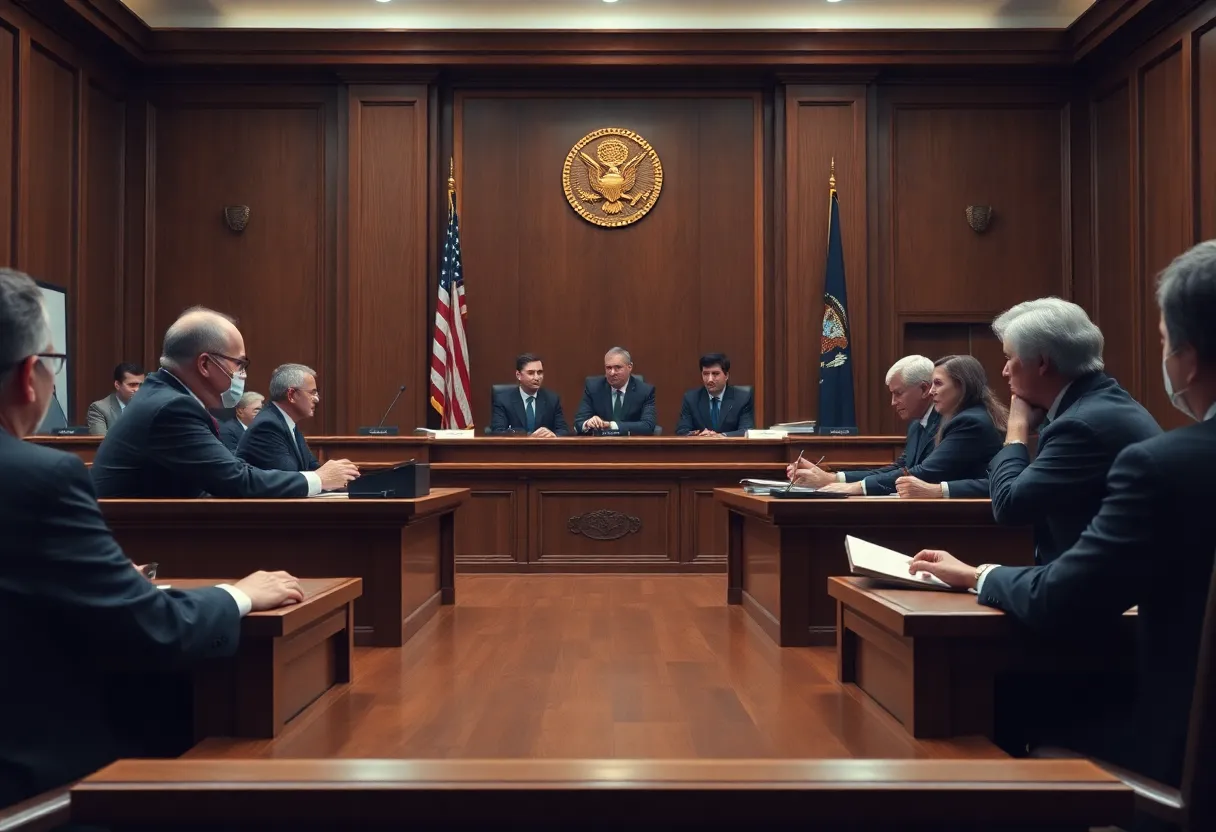News Summary
A federal appeals court has ruled against President Trump’s reciprocal tariffs, potentially impacting the administration’s trade policies. The ruling allows the tariffs to remain until October 14, with an option for appeal to the U.S. Supreme Court. The case questioned the legality of the tariffs under the International Emergency Economic Powers Act, with dissent within the court suggesting future challenges. The tariffs, which are designed to address the fentanyl crisis and trade deficit, are now at risk of being struck down, affecting prices across the American economy.
Washington, D.C. – A federal appeals court has ruled against President Trump’s reciprocal tariffs, a decision that could hinder the administration’s trade policies. The ruling, which was passed by a vote of 7-4, allows the tariffs to remain in place until October 14, providing the administration with an opportunity to appeal to the U.S. Supreme Court.
The case centered around the legality of Trump’s use of the International Emergency Economic Powers Act (IEEPA) to impose import fees and additional tariffs. The ruling was supported by arguments from twelve blue states challenging the tariffs, which many allege are unjustified and economically damaging.
In reaction to the ruling, Peter Navarro, a senior counselor for trade and manufacturing at the White House, expressed vehement opposition. He labeled the decision as “weaponized partisan injustice” and claimed that the court’s majority ruling was biased due to a Democratic influence among the judges. He asserted that the court’s determination could potentially undermine U.S. trade protections and accused certain importers of prioritizing inexpensive Chinese goods over American interests.
Despite the ruling against the tariffs, Navarro highlighted a strong dissent within the court that he believes provides a robust framework for the impending appeal. This dissent raised critical questions regarding three key issues: the existence of a national emergency, the classification of tariffs as an exercise of import regulation, and the legal justification for asserting that the tariffs were permanent.
Navarro defended the administration’s stance, stating that the ongoing fentanyl crisis and a worsening trade deficit constitute a real national emergency that justifies the imposition of tariffs. He argued that tariffs are a historically accepted method for regulating imports and that the administration had never indicated the tariffs would remain indefinitely. According to Navarro, the tariffs could be revoked should China and drug cartels cease their harmful practices.
Overall, this ruling presents a significant challenge for Trump’s economic strategy, which heavily relies on tariffs as both a revenue-generating tool and a means to leverage negotiations with foreign leaders. Internal documents have suggested that the administration’s use of tariffs might encompass broader national security interests, along with individual corporate concerns, extending beyond public acknowledgment and scrutiny.
The implications of these tariffs have been felt across the American economy, with the average U.S. tariff rate reaching heights not seen since the Great Depression. This increase translates to higher prices for numerous everyday products, including appliances, home furnishings, toys, and footwear, affecting the purchasing power of American consumers. Should the current round of escalated tariffs remain in effect, more goods could face price hikes in the near future.
According to Navarro, if the appeal does not succeed, it could signify a substantial blow to the economic stability of the nation, echoing the administration’s commitment to confront what it views as unjust trade practices. With the deadline for an appeal looming, the administration’s next steps will be closely monitored as the future of its tariff strategy hangs in the balance.
Deeper Dive: News & Info About This Topic
HERE Resources
Trump Concludes Scotland Visit Discussing Whisky Tariffs and Gaza
Trump’s Visit to Scotland Amid Golf Course Opening and Protests
Trump’s Visit to Scotland Sparks Security and Protests
Trump’s Visit to Scotland: Golf Resorts and Trade Talks
Trump’s Controversial Visit to Scotland Sparks Protests
Protests Erupt in Scotland During Trump’s Visit
Trump’s Visit to Scotland Sparks Protests and Trade Talks
Donald Trump Arrives for Visit in Aberdeen, Scotland
Trump’s Controversial Visit to Scotland Sparks Protests
Trump Inspects Federal Reserve Renovation Amid Cost Controversy
Additional Resources
- Washington Post: Trump Tariff Policy in Jeopardy
- Wikipedia: Tariffs in the United States
- Washington Post: Federal Court Blocks Trump Tariffs
- Google Search: Trump Tariff Policy
- Washington Post: Trump Trade Policy and National Security
- Google Scholar: Trump Tariff Policy
- Washington Post: Tariffs and Prices of Goods
- Encyclopedia Britannica: Tariff
- Washington Post: Trump Hikes Tariffs on India
- Google News: Tariffs Impact on Economy

Author: STAFF HERE WASHINGTON DC
The WASHINGTON DC STAFF WRITER represents the experienced team at HEREWashingtonDC.com, your go-to source for actionable local news and information in Washington, DC, and beyond. Specializing in "news you can use," we cover essential topics like product reviews for personal and business needs, local business directories, politics, real estate trends, neighborhood insights, and regional news affecting the area—with deep expertise drawn from years of dedicated reporting and strong community input, including local press releases and business updates. We deliver top reporting on high-value events such as the National Cherry Blossom Festival, Kennedy Center Honors, and the Washington Auto Show. Our coverage extends to key organizations like the Greater Washington Board of Trade and Destination DC, plus leading businesses in government contracting and technology that power the local economy such as Lockheed Martin and Amazon. As part of the broader HERE network, we provide comprehensive, credible insights into the dynamic landscape of the Washington metropolitan area.




